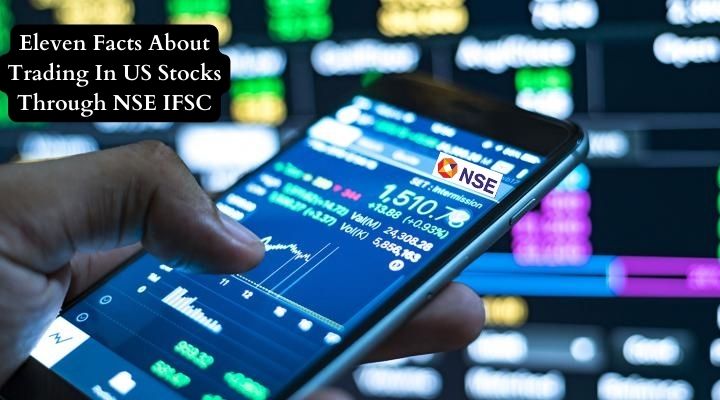Trading with the Fortune 10 is a dream for many. The NSE International Exchange (NSE IFSC), a wholly-owned subsidiary of the NSE, began trading in US stocks on June 5th, 2017.
What is the purpose of the NSE International Exchange?
The Modi government established NSE in India’s first International Financial Service Centre (IFSC.) The NSE International Exchange aims to expand the financial industry and attract money into India.
Benefits include no income tax, no security transaction tax, no commodity transaction tax, no dividend distribution tax, no capital gain tax.
Can foreign investors trade Indian stocks?
The government has cleared BSE and NSE’s subsidiaries to establish stock exchanges in GIFT City. While both exchanges originally targeted foreign investors and non-resident Indians, they recognized the need for a retail investor offering in India.
Facts About NSE
NSE has several uses, most of which are helpful. It is undeniably an exciting Upcoming IPO in India nowadays. Here are some facts about it.
-
Can Indians trade on the NSE?
Money sent to GIFT by an Indian investor is considered money sent out of India through LRS (Liberalized Remittance Scheme). As a result, trading in derivatives or margin cannot exceed $250,000 per year.
-
Trading Limits
The NSE said it would trade 50 US equities through unsponsored depository receipts.
Due to the regulatory sandbox (test), NSE IFSC can only accept a limited number of clients. More clients will be authorized after the IFSCA approves the product.
-
Accepted Payment
Currency swings are avoided by transacting and settling in US dollars.
-
Timings
It’s open from 8 pm until 2.30 am IST. Since some of these US equities are worth hundreds to thousands of dollars per share, trading or holding fractional shares of these corporations is also permitted.
-
Tradeable financial products
Securities issued by qualifying issuers are authorized to be traded similarly to other exchange-traded products traded on stock exchanges in FATF/IOSCO-compliant jurisdictions, subject to SEBI/IFSCA authorization.
-
Legislation
The IFSC will regulate the holding, clearing, settlement, and trading in US stocks.
-
Ownership
The amount of NSE IFSC receipts for a specific entity will be comparable to having a proportionate share in the firm. There will be trading on the exchange of securities from eight US firms. Hence, we’ll compare each of their receipts:
- Alphabet Inc (GOOGL) – 200 NSE IFSC receipts
- Amazon Inc (AMZN) – 200 NSE IFSC receipts
- Tesla Inc (TSLA) – 100 NSE IFSC receipts
- Meta Platforms (FB) – 50 NSE IFSC receipts
- Microsoft Corp (MSFT) – 50 NSE IFSC receipts
- Netflix Inc (NFLX) – 50 NSE IFSC receipts
- Apple Inc (AAPL) – 25 receipts
- Walmart Inc (WMT) – 25 receipts
-
Demat Accounts
The website allows Indian investors to buy US equities at minimal cost and ease.
Investors may hold the depository receipts in their GIFT City Demat accounts and obtain corporate action advantages for the underlying stock.
-
How Does It Work?
Using Depository Receipts allows a firm listed on one market to attract investors and trade in another (DRS). Sponsored DR is offered by a firm, whereas unsponsored DR is not.
Unsponsored DRs will trade on NSE IFSC, meaning the firms do not issue them. An overseas custodian will hold the shares in the US on behalf of NSE IFSC and subsequently issue SDRs to the NSE IFSC depository account in India. The DRS will, after that, trade on the NSE IFSC.
Since the exchange is young, NSE IFSC has worked with big market makers to provide low-cost trading. Market makers must first park shares with an international custodian before selling prices.
For example, a $360 Netflix share will be 24 times cheaper at the top of the receipt.
-
Trading
A T+3 day settlement indicates that after stocks or DRs are purchased, they will be credited to the Demat account within three days (two days in India). Similarly, proceeds from sold stocks will be refunded three days later. So, unlike in India, additional transactions are not allowed until the settlement is complete.
No intraday leveraged trading is permitted, or transactions are limited to the account’s funds or stocks. No naked short trades either.
-
Cost
Aside from the Top brokers in India enabling the transaction on NSE IFSC, the exchange will charge 12 cents per $100 or 0.12%.
The 0.00345 percent in India for equities trading makes this a costly fee. However, this structure entails substantial fixed regulatory expenses, particularly when completing W8 BEN forms or disclosing beneficial ownership to US tax authorities.
The RBI’s LRS guidelines prevent leveraged trading. Therefore, the volume of trading will be substantially lower than onshore exchanges. I would expect transaction fees to decrease as trade volume increases.
The National Stock Exchange’s (NSE) International Financial Services Centre (IFSC) platform in Gujarat’s GIFT City has started trading in eight US stocks from today, March 3, 2022. The trading will start in 8 stocks comprising Amazon, Apple, Alphabet (Google), Netflix, Tesla, Meta (Facebook), Walmart, and Microsoft, which will eventually be increasing to 50 stocks. For availing of the facility domestic investors need to open a Demat account at the IFSC and the offering will be in the form of un-sponsored depository receipts.

